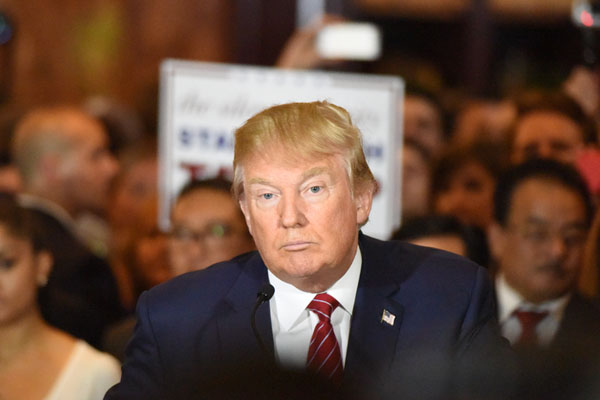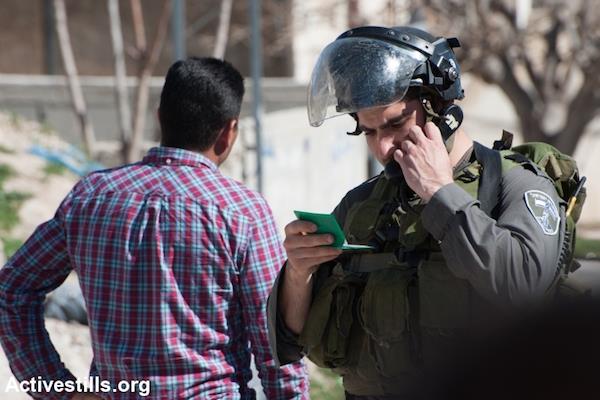The Republican presidential candidate wants Muslims to carry special ID cards. A West Bank Palestinian uses her personal experience to explain what that really means.
By Nadia Naser-Najjab

Donald Trump recently suggested that Muslims in the United States should be registered in a database and forced to carry special ID cards. This, he would have us believe, will help to make American citizens safer from the consequences of the wars successive U.S. administrations have waged around the world.
As a Palestinian who has studied and lived in the U.S., Trump’s disgusting bigotry offends me on a very personal level. However, the proposals also had an impact on me in another sense: as a Palestinian resident of the occupied West Bank I have to carry an ID card that I am required to produce whenever a representative of the Israeli state demands it of me. In my own country, I am the ones without rights; I am the one who has to justify my own presence to an occupying power.
Upon producing my ID, I am always aware of the fact that to the official glancing at the card I am little more than a few words and a photograph: I am, in effect, an accessory to this piece of plastic. And yet, in another sense, this document has no relation to me: it is part of an apparatus of control which reduces me to a unit of analysis that can be subtracted, divided and multiplied.
The card does not guarantee me rights nor does it enable me to make demands. Quite the contrary, it enables me only to respond to the demands of others, to present myself on terms that might satisfy the rude, abrupt and disinterested official who has deigned to take a few moments to bark questions at me. In producing this card for Israeli troops or officials I do not convey who I am, only what I am not. If I produce it I am not a threat, I am not a terrorist, and I am not guilty of an offense against his or her government or the laws the occupying authority has no right to pass or administer in the first place.

This card has become inseparable from the occupation itself, from the various ways it imposes itself upon everyday existence. In this aspect the occupation appears in its immediacy: the fences, the checkpoints, the armed soldiers. However, the occupation also exerts control through more subtle psychological means; that is, through a sense of uncertainty and unpredictability. Both aspects – the material embodiment of occupation and the more elusive sense of arbitrariness and powerlessness – are embodied within this piece of plastic.
To even obtain the ID card in the first place is to make a concession to a hated occupation whose only authority is derived from the violence and brutality it exercises to control your life. Every minutiae of your existence is subject to its unyielding gaze. Nothing else is to be expected or demanded: with the security of the state as its overarching justification, the bureaucracy need recognize no limitation or constraint. Once Palestinians have been defined as a threat they can be subject to any impediment, any control and any petty restriction. It is for this reason that I did not graduate from Birzeit University on time. The university was closed several times by an Israeli military order in the early 80s. In early 90s the closure of Jerusalem forced me to resign from my job because I was unable to enter the city.
Reflecting upon these features of the occupation, I often find it is the small details that are as telling as the larger ones. To take one example, in the pre-Oslo era, even a driver’s license were regulated and issued by Israeli military authorities – the color of your license plate indicated the area of the occupied territories in which the car had been registered. In reflecting upon this, I would suggest that it is not in the grand and imposing structures of the occupation – the walls, the prisons, the roadblocks – where one can find its essence, but rather in these small details, which correspond to a desire to control each and every aspect of Palestinian life. In registering the tenacity and pervasiveness of this desire, it is difficult to avoid the conclusion that it knows no limitation or constraint and will only stop at the point where it meets active resistance.
On closer reflection, I found that the response of those subject to these petty restrictions is equally telling. Before the Oslo Accords, upon attaining a driver’s license, successful Palestinian applicants frequently celebrated by sharing kanafe (the Palestinian dessert) with relatives and friends. For Americans this would of course be inconceivable – could the likes of Donald Trump ever envisage celebrating the mundane occurrence of being granted the most basic of rights? Could he ever acknowledge how it feels to live in a society where every right is not enshrined in law but is subject to the benevolence of a bureaucrat? And, finally, could he ever acknowledge that an ID card is more than a piece of plastic — that it is the material embodiment of a system that dehumanizes both those who control it and those who are subject to it? If he cannot, then let us at least hope that ordinary Americans will do so on his behalf.
Dr. Nadia Naser-Najjab has a PhD in Middle East Studies and is an Associate Research Fellow at the European Center of Palestine Studies-Institute of Arab and Islamic Studies at the University of Exeter.
